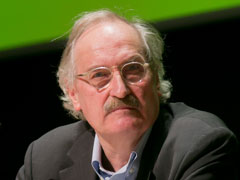The German philosopher discusses his view of public space as the place in which people seek the best solutions for the political challenges they face. He also upholds face-to-face relations in a situation where public space is fast expanding on the Internet
Shared Spaces recorded this conversation with Axel Honneth in January 2015 when he visited the Centre of Contemporary Culture of Barcelona (CCCB) to give the lecture “Freedom”, which inaugurated the Barcelona Debate 2015 cycle “Wield the Word”. Referring to the title of the cycle, Honneth says, “Wielding the word is the basic act of democracy and democratic reform, and this can only occur in public space”.
Continuing along these lines, he added that, for him, the public domain is the public space where, by means of taking into account the political opinions and convictions of others, problems are redefined and better solutions are sought for challenges being faced. While mentioning the importance of the freedom to do what one likes without hindrance (negative freedom), Honneth also believes that the public sphere of freedom is even more important because democracy is based on this, as is the social and communicative freedom it represents. He is therefore more inclined to understand freedom as the result of intersubjective – joint – action of society.
Just as Zygmunt Bauman did before him in Shared Spaces, Honneth upholds direct, personal relationships, staunchly defending physical public space as opposed to the expanding public space of the Internet. In this regard, he warns of two possible dangers: “de-spatialisation” (disconnection from nearby, local, physical, public space) and the fact that we might believe that relationships established through such media could act as a substitute for direct, personal relationships, which he believes are much more powerful: “taking part in demonstrations is, for me, a much deeper experience than sitting at my desk and surfing the Web”.
Finally, when it comes to naming a particular public space, Honneth says that his preferences have been changing over time. After citing some of his favourite public spaces as a young man, oddly enough he mentions a “public-private”, non-physical space – reading – as his favourite public space today. Stressing the fact that one’s favourite public space can change with age, he also emphasises the importance of growing up with public space from early childhood.



